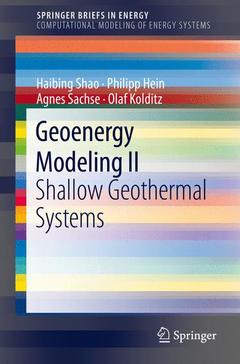Description
Geoenergy Modeling II, 1st ed. 2016
Shallow Geothermal Systems
Computational Modeling of Energy Systems Series
Authors: Shao Haibing, Hein Philipp, Sachse Agnes, Kolditz Olaf
Language: English
Subject for Geoenergy Modeling II:
52.74 €
In Print (Delivery period: 15 days).
Add to cartSupport: Print on demand
Description
/li>Biography
/li>Comment
/li>
Junior-Prof. Dr. Haibing Shao leads the work group Geothermal Systems Analysis ( https://webmail.springer-sbm.com/owa/redir.aspx?SURL=9Om38Sp3h39lFx5a1p_-9BUiz0RjHJ6aiZPHSVFMK5hk1t-eCX3UCGgAdAB0AHAAcwA6AC8ALwB3AHcAdwAuAHUAZgB6AC4AZABlAC8AaQBuAGQAZQB4AC4AcABoAHAAPwBlAG4APQAzADcANAA4ADIA&URL=https%3a%2f%2fwww.ufz.de%2findex.php%3fen%3d37482) in the Department of Environmental Informatics at the Helmholtz Centre for Environmental Research - UFZ. He is also jointly appointed as a Junior Professor at the Technische Universität Bergakademie Freiberg. His research interests are the numerical modelling of coupled processes in shallow and deep geothermal reservoirs. As a senior developer, he has been working with the open-source scientific software OpenGeoSys (www.opengeosys.org) for more than 10 years. He studied environmental engineering at the Tongji University in Shanghai (China) and obtained his Master’s degree at the University of Tübingen. In 2010, he earned his PhD title from TU Dresden, and since then working as a staff scientist at the UFZ.
Philipp Hein is at the time of publication
enrolled as a PhD student at Technische Universität Dresden and was working as a research assistant at University of Applied Sciences Leipzig as well as a guest scientist at the Department of Environmental Informatics of the Helmholtz Centre of Environmental Research - UFZ Leipzig. His research interests are the sustainable and efficient utilization of shallow geothermal energy and numerical modeling of borehole heat exchanger coupled ground source heat pump systems. Philipp Hein studied mechanical engineering and received a Bachelor and Master degree at the University of Applied Sciences Düsseldorf.
Dr. Agnes Sachse is a postdoctoral researcher
at the Department of Environmental Informatics at the Helmholtz Centre for Environmental Research – UFZ in Leipzig, Germany. She studied Geography, Meteorology and Geology and received her doctoral degree in hyd
In-depth coverage of analytical and numerical modeling of shallow geothermal systems;
Applies widely used dual-continuum approach to the simulation of borehole heat exchangers (BHE) and their interaction with the surrounding soil;
Uses the included methods to analyze a real test site and make practical suggestions regarding BHE and Ground Source Heat Pump (GSHP) system design and optimization;

